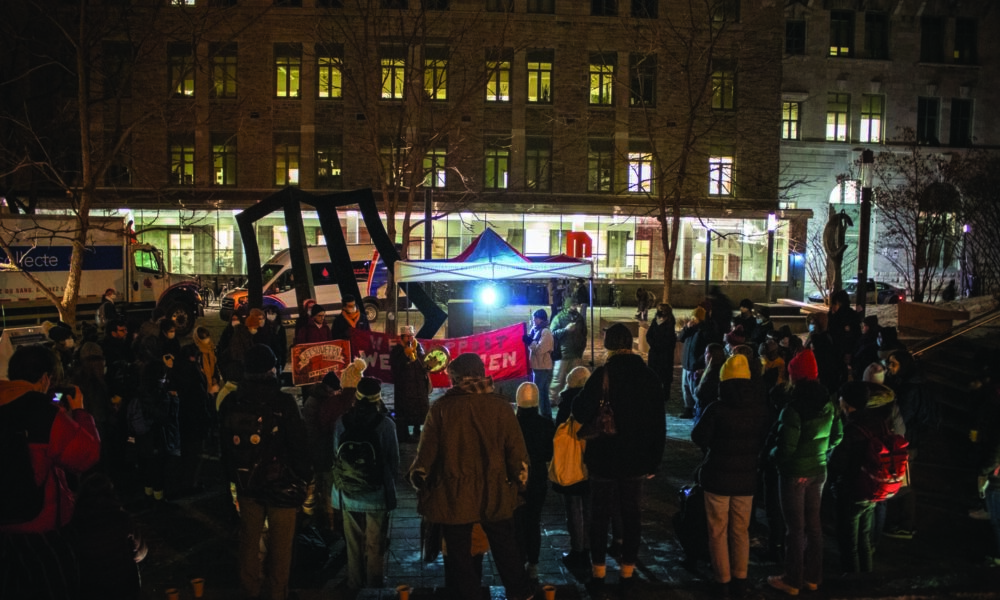Divest McGill and other campus groups gathered outside the James Administration Building on Dec. 1 to show solidarity with Wet’suwet’en land defenders. Student activists assembled to listen to speakers and gather signatures for a petition that urges McGill to divest from TC Energy—the fossil fuel company building the Coastal GasLink (CGL) pipeline through Wet’suwet’en territory without proper consent.
During the event, Divest members walked around with QR codes that linked to the petition and offered attendees free hot chocolate. The group then gathered around a tent to listen to the lineup of speakers that included Marlene Hale, a Wet’suwet’en elder, Atreyu Rivers Lewis, events coordinator for the Indigenous Student Alliance (ISA), Andreas Iakovos Koch from the Divest for Human Rights campaign and Students in Solidarity for Palestinian Human Rights (SPHR) McGill, Elijah Aedo-Castillo from the Black Student Network (BSN) McGill, Daniel Tamblyn-Watts from the McGill Corporate Accountability Project, Shelly Bahng from the Pan-Asian Collective, and Mireya Bayancela, an Indigenous storyteller, artist, and activist.
Hale was the first to speak, condemning the Royal Canadian Mounted Police (RCMP), who have been brutally opposing land defenders, invading resistance camps, and arresting anyone they deem to be in the way of the pipeline’s construction.
“[It is] not only [that] the Indigenous people of the Wet’suwet’en nation are being tortured, […] but now it’s also the journalists, and that’s where it really hits hard and hits home for us,” said Hale. “Without the word getting out [about] what’s going on in this world, without having journalists writing for us [and] taking down everything that the RCMP [and] CGL [are] doing in our nation […] the world will never know. The world would never know what is going on with us in our traditional land.”
Other Indigenous speakers touched on their experiences as McGill students. Lewis, a U1 Arts student from the Anishinaabe Nation in Ontario, described facing racism—including blatant denials of history—throughout their time at university.
“I am disgusted to be among professors and even some students who are so uneducated and so ignorant towards Indigenous struggles,” said Lewis. “They use words like ‘post-colonialism’ as an insult to our struggles. They use words to try to justify and normalize violence and genocide, forced sterilization, and assimilation policies [….] They do it every day so casually. I’ve had white professors tell me horrible things, [like] that the Cree or the Inuit had it easier because they lived up north. I’ve had professors tell me that we’re never going to live in a society that’s without colonialism. I’ve had professors tell me that it’s a dark past and a dark history and that our lived experiences are based on just the past.”
Stefan Christoff, radio host of Free City Radio on CKUT 90.3 FM, helped write the petition. Christoff spoke to The McGill Tribune ahead of the protest, explaining the implications of McGill’s roughly $4.7-million investment in TC Energy.
“McGill has talked a lot about sustainability, and [has] talked a lot about the environmental crisis we all face,” Christoff said. “[McGill’s investments are] obviously a direct contradiction with that rhetoric, and beyond [the fact that] these investments directly are constructing an oil and gas pipeline, they’re constructing that pipeline on Indigenous lands [….] Many, many members of the Wet’suwet’en Nation are against this pipeline.”
Divest sent the petition to the McGill administration on Dec. 2, with 748 signatures.









